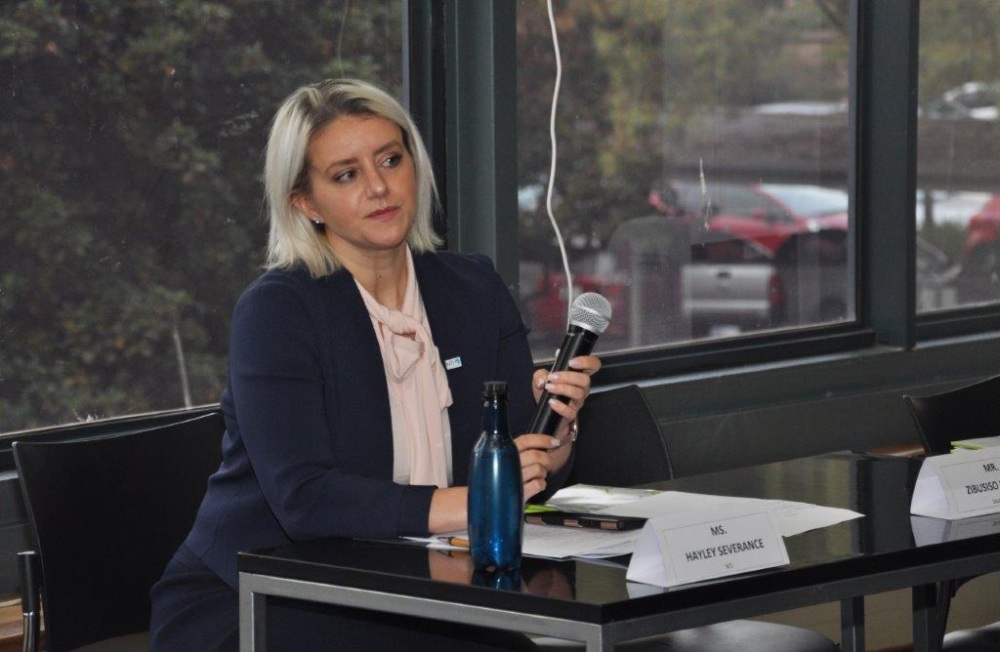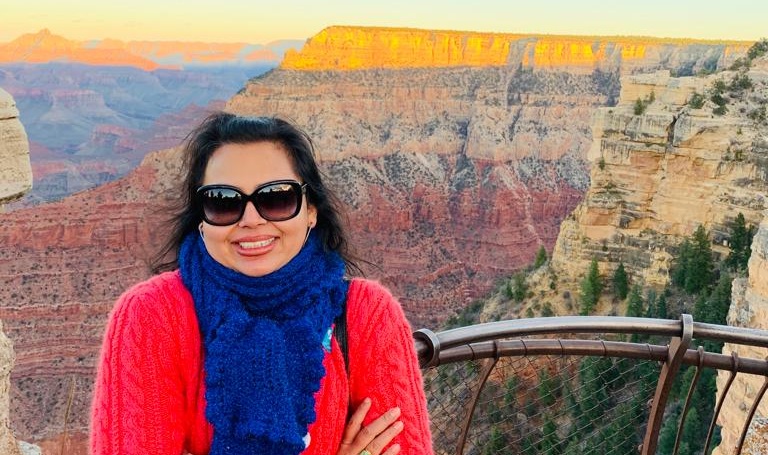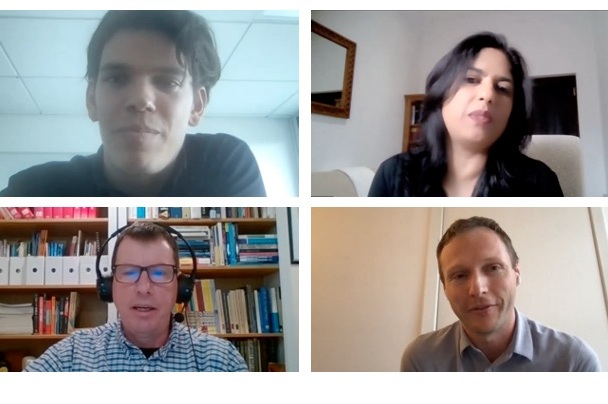
Mimi Hall
Vice President, Communications
Atomic Pulse
An epidemiologist focused on preventing catastrophic biological events and building health security capacity around the world, Hayley Anne Severance brought her expertise to NTI’s expanding biosecurity team in 2018. She came to NTI from the Pentagon, where she most recently served as a senior policy advisor in the Office of the Deputy Assistant Secretary of Defense for Countering Weapons of Mass Destruction. Prior to that, Severance served as the epidemiology subject matter expert for the Defense Threat Reduction Agency’s Cooperative Biological Engagement Program, assessing international biological event surveillance, detection, and response systems and developing implementation strategies to meet the programs goals in biosafety and biosecurity, cooperative biological research, and surveillance. Today, she serves as senior director for NTI’s Global Biological Policy and Programs team.
Over the course of this year, as NTI marks its 20th anniversary, our experts will share some reflections on two decades of working to build a safer world—accomplishments and challenges, lessons learned along the way, visions for the future. Today, we hear from Severance, whose broad experience includes open-source media surveillance, disease detection system evaluation, global health security policy development, and more.
Just months before COVID-19 first emerged in China, NTI released the Global Health Security Index. It was strikingly prescient, warning that national health security was fundamentally weak around the world and no country was fully prepared to handle and epidemic or pandemic. Do you think the world will be better prepared for the next pandemic? And there will be a next one, right?
Yes, there will be a next one—and I hope the world will be better prepared for it. We’re certainly working as hard as we possibly can to make sure that’s the case.
To back up to 2019, shortly before the first cases of COVID-19 emerged publicly, the GHS Index reported an average preparedness score of 40.2 out of possible 100, showing that, collectively, international health security capacity is very weak. Of course, some countries, including the United States, had higher scores, but I think we saw through the pandemic that regardless of how strong your capacity is, as measured by the index, if you don’t have the accompanying political leadership, strong and decisive political leadership, and if you’re not deploying those capacities in an effective manner, you continue to remain vulnerable to pandemics.
It’s up to us now to determine how devastating the next pandemic will be, and if we can stop it at the source, whether that means detecting it as it emerges naturally and using public health measures to stop it, or putting into place biosafety measures at a laboratory to prevent accidental exposures or keeping dangerous biological materials secure to prevent misuse. We really have to engage and invest in those capacities now. We also have to instill the strong leadership that’s required and engage the public on their important role in future pandemics to prevent the next one from being as devastating or even more devastating than COVID-19.
You oversee the Global Biosecurity Dialogue, an effort designed to enhance biosecurity around the world by building cross-border collaboration among countries and promoting investment in biosecurity assistance. How is that effort going?
It’s been fantastic, and I’m so proud and pleased to be a part of it. It’s a really interesting model for making progress on some very challenging issues. Within the global health and biosecurity community, there are a lot of very formal meetings where country representatives go to give statements, and those are important, but the Global Biosecurity Dialogue was designed to be an informal forum that could help spark innovative and forward-looking thinking and solutions. It was really designed to allow for more creative dialogue around the issues that experts and policymakers are facing around the world in their efforts to enhance safety and security to protect against biological threats.
So, the value of the Global Biosecurity Dialogue really has been the network that it has created, and the ideas and new actions coming out of it. It has been really effective in that sense. We have now a huge community of biosecurity champions around the world that I have the privilege of engaging with regularly, and they’re so committed to improving health systems and keeping their populations safe and secure.
We have a couple of pretty advanced actions that have come out of the dialogue. One is that Africa CDC’s regional initiatives to strengthen biosafety and biosecurity have advanced beyond what we had even envisioned due to their commitment to make biosafety and biosecurity a strategic focus on the continent and to enhance member states’ capacities to prevent accidental or deliberate biological events.
I’m really thrilled with the concrete, actionable ideas that have come out of the dialogue—and the passion and commitment from the participants is just an inspiration.
Our annual Next Generation for Biosecurity Competition also is designed to foster cross-border collaboration. The competition asks young professionals to work together across regions of the globe to develop innovative ideas to improve biosecurity. The results have been so impressive!
The risks that could lead to catastrophic biological events continue to get more complicated and to rapidly evolve, especially with advances in biotechnologies. This scientific progress is quickly outpacing kind of the traditional mechanisms established to oversee and mitigate risks.
So, our annual Next Generation for Biosecurity Competition looks to foster and raise up voices of the next generation—young experts who are more used to the fast pace of technological development. It is critical to engage them to help us keep pace with these emerging risks. That’s why NTI is really interested in providing opportunities through the contest for these early-career leaders to influence the international dialogue around these emerging risks. It has been impressive over the past few years to see how these young competitors have really become leaders in their own right. They’re speaking at these international meetings and infusing new ideas into traditional dialogues. It’s been a real pleasure for NTI to help spur the process of facilitating new solutions to existing problems with the help of the next generation.
NTI’s Bio Team is continually advocating for the need to strengthen health security globally – even before COVID-19. Have you seen an increased willingness among political leaders to invest in health security now that they have experienced a pandemic?
We do see some movement in the right direction. In the United States, as one example, there is legislation moving through Congress that, importantly, calls for new mechanisms for global health security financing so that we can get out of kind of this loop of what we call panic-and-neglect funding, pouring tons of money in when there’s a crisis but then not sustaining that level of investment when the crisis has passed.
What a new financing mechanism could do is use new and existing financial resources from multiple sources—from international bodies, from philanthropic organizations, from governments—to incentivize other countries to invest in their own domestic health systems. So, yes, we’re seeing some progress, but we need to continue pushing forward if we want to see any real, sustainable change.
NTI | bio also is working to create the world’s first dedicated global biosecurity entity, and you’ve played a leading role in this effort. Can you explain what it is and what gap it would fill?
Sure. Well, first of all, biotechnology and bioscience advancement are essential to combatting pandemics, as we have seen with COVID-19. However, responsible innovation is needed to mitigate any potential risks of accidents, unintended consequences, or deliberate misuse associated with this rapidly evolving field. So far, the pace of technological advancement has outpaced the ability of governments to provide effective oversight. I think just five percent of countries, as measured by the GHS Index, have oversight mechanisms to mitigate risks associated with dual-use research. To address that vulnerability, you need improved norms that address emerging risks and also tools and best practices that incentivize compliance with those norms.
The proposed global biosecurity entity, which we are working with international experts and leaders to shape, will help fill a global governance gap and, ideally, contribute to a future where we can develop and apply new biotechnologies while simultaneously incentivizing best practices and tools to reduce associated risks. I’m excited about this project. It is all about finding and employing very practical solutions to an incredibly complex and constantly evolving issue set.
Sign up for our newsletter to get the latest on nuclear and biological threats.
Aparupa Sengupta, senior program officer for NTI’s Global Biological Policy and Programs team (NTI | bio), sat down with NTI’s Mary Fulham for the latest in Atomic Pulse’s “Get to Know NTI” series.
Today, leaders preparing for the BWC’s Ninth Review Conference in August are exploring whether the global community can leverage increased attention and political will to strengthen the BWC by building mechanisms that increase transparency and trust with the goal of reducing the risk of global catastrophic biological events. A particular aim is determining whether there are effective and politically viable ways to enforce the treaty.
Bridging Health and Security Sectors to Address High-Consequence Biological Risks



